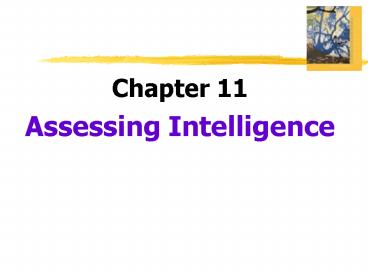Assessing Intelligence PowerPoint PPT Presentation
1 / 16
Title: Assessing Intelligence
1
- Chapter 11
- Assessing Intelligence
2
Origins of Intelligence Testing
- Mental Age
- a measure of intelligence test performance
devised by Binet - chronological age that most typically corresponds
to a given level of performance - child who does as well as the average 8-year-old
is said to have a mental age of 8
3
Origins of Intelligence Testing
- Stanford-Binet
- the widely used American revision of Binets
original intelligence test - revised by Terman at Stanford University
4
Origins of Intelligence Testing
- Intelligence Quotient (IQ)
- defined originally the ratio of mental age (ma)
to chronological age (ca) multiplied by 100 - IQ ma/ca x 100)
- on contemporary tests, the average performance
for a given age is assigned a score of 100
5
Assessing Intelligence
- Aptitude Test
- a test designed to predict a persons future
performance - aptitude is the capacity to learn
- Achievement Test
- a test designed to assess what a person has
learned
6
Assessing Intelligence
- Wechsler Adult Intelligence Scale (WAIS)
- most widely used intelligence test
- subtests
- verbal
- performance (nonverbal)
7
Assessing Intelligence Sample Items from the WAIS
8
Assessing Intelligence
- Standardization
- defining meaningful scores by comparison with the
performance of a pretested standardization
group - Normal Curve
- the symmetrical bell-shaped curve that describes
the distribution of many physical and
psychological attributes - most scores fall near the average, and fewer and
fewer scores lie near the extremes
9
The Normal Curve
10
Getting Smarter?
11
Assessing Intelligence
- Reliability
- the extent to which a test yields consistent
results - assessed by consistency of scores on
- two halves of the test
- alternate forms of the test
- retesting
- Validity
- the extent to which a test measures or predicts
what it is supposed to
12
Assessing Intelligence
- Content Validity
- the extent to which a test samples the behavior
that is of interest - driving test that samples driving tasks
- Criterion
- behavior (such as college grades) that a test
(such as the SAT) is designed to predict - the measure used in defining whether the test has
predictive validity
13
Assessing Intelligence
- Predictive Validity
- success with which a test predicts the behavior
it is designed to predict - assessed by computing the correlation between
test scores and the criterion behavior - also called criterion-related validity
14
Assessing Intelligence
- As the range of data under consideration narrows,
its predictive power diminishes
15
The Dynamics of Intelligence
- Mental Retardation
- a condition of limited mental ability
- indicated by an intelligence score below 70
- produces difficulty in adapting to the demands of
life - varies from mild to profound
- Down Syndrome
- retardation and associated physical disorders
caused by an extra chromosome in ones genetic
makeup
16
The Dynamics of Intelligence

